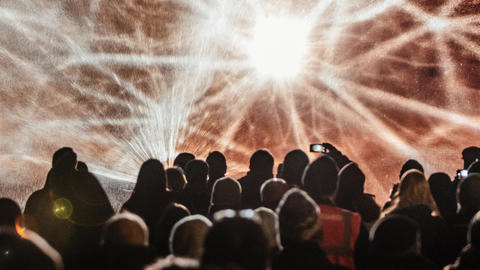
Vanessa Bellaar Spruijt Producer
on Thu 22 March 2018Connecting people
Posted on Thu 22 March 2018
Reflections on putting arts and culture at the heart of new technology, and the can-do spirit of Bristol and its people
I have been producing a project about imagining the future, and giving other people the opportunity to do the same for one weekend only.
This was not design fiction, nor was it guess work. It was a research trial disguised as a weekend of amazing cultural, critical and engaging experiences: Layered Realities. The world’s first urban public 5G testbed.
On Sat 17 and Sun 18 March Bristol's Millennium Square was flooded with a whole range of experimental wireless networks that simulated some of the promising capabilities the next generation of wireless technology will offer. These networks were explored, tested and questioned through a programme of live experiences, technical demos and a series of critical talks.
Just over 3000 people engaged over the weekend despite Arctic conditions and snow! This is a testament to our great teams at Watershed, We The Curious and the University of Bristol (not to mention lots of external suppliers and freelancers). Most of all it reflects the enthusiasm, perseverance and sheer can-do spirit that made Bristol the perfect place for this event.
As one of our audience members said:
"I'm really proud to live in Bristol actually, and the fact that we are leading the way in terms of technology and creativity."
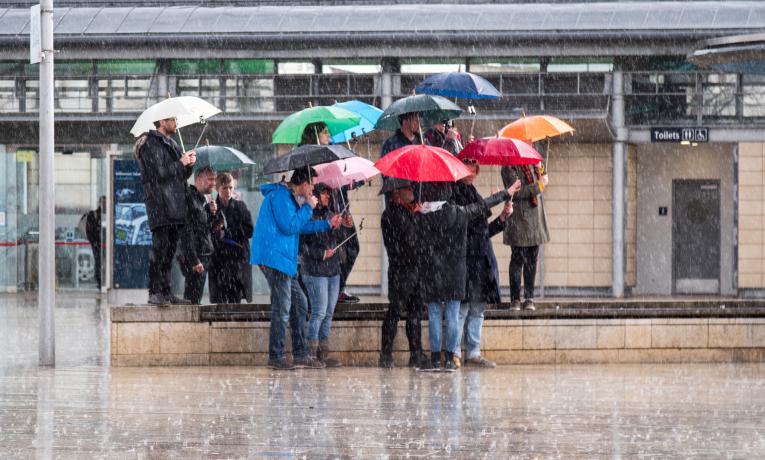
Duncan Speakman’s & Uninvited Guest’s Billennium Square in the torrential rain (Photo: Jon Aitken)
What is 5G?
5G isn't just about improving the speed of 4G (or 3G if you are still stuck with that). The difference that 5G will make is that you will no longer be scrambling around for reliable speeds and getting frustrated with lack of coverage, instead you will have a seamless and reliable high speed connection, whether indoors or in really populated areas. The 5G network will have the capability to support an enormous increase in simultaneously connected devices, so we’ll probably see a major increase in connected objects in the household as well as in public spaces.
The most significant change, however, will be no more latency (the delay or lag in between request and response). With 5G the network responses will be well under 10 milliseconds, opening up a world of possibilities for augmented reality apps on your phone, mobile virtual reality games and even health applications such as remote surgery.
So by 2030, we hope that the UK will be at the forefront of the next wave of mobile technology. But what is interesting about that? Did we even really notice the change from 3G to 4G? Do we even want a world where people can watch Netflix on the bus?
Placing arts and culture at the heart of new technology
We gave artists and thinkers the chance to experiment with new technology to create meaningful experiences for audiences, but also to test and question how it is or could be applied thereby placing arts and culture at the heart of new, innovative technologies (read Culture is Digital, the latest policy paper by DCMS, which talks more about breaking down the silos between the cultural sectors, blurring the lines between disciplines, and has a few mentions of Watershed). Duncan Speakman and Uninvited Guests took people on a guided walk through time using real-time images and sounds based on their own imaginations. Kaleider offered an untethered poetic virtual reality dance piece, whereas Joanie Lemercier took us through the universe with stunning 3D projections onto a wall of water that responded to your presence.
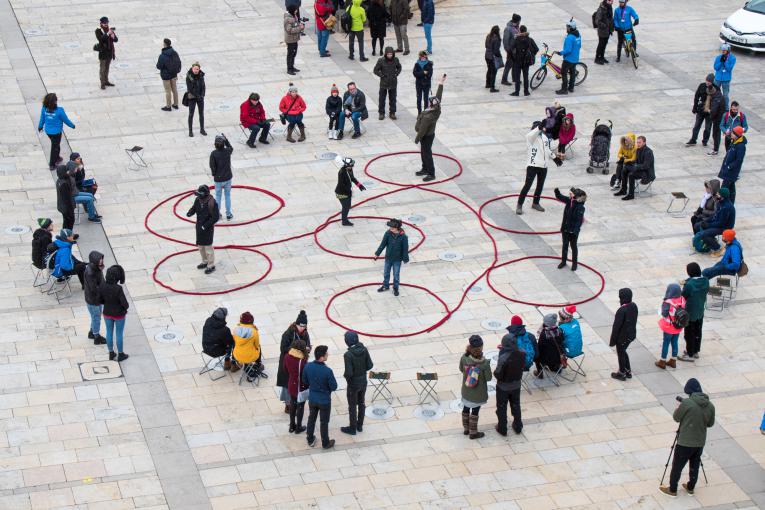
From the light of the fire, our dancing shadows (Photo: Jon Aitken)
The future, or at least some of it, was available on Millennium Square. The University of Bristol’s Smart Internet Lab has been collaborating with many partners to implement a range of simulated 5G networks that the artists we commissioned used to enable their works. This is a huge challenge! Just imagine building something that does not exist yet, and then making something that does the things everyone would like this thing that does not exist yet to do.
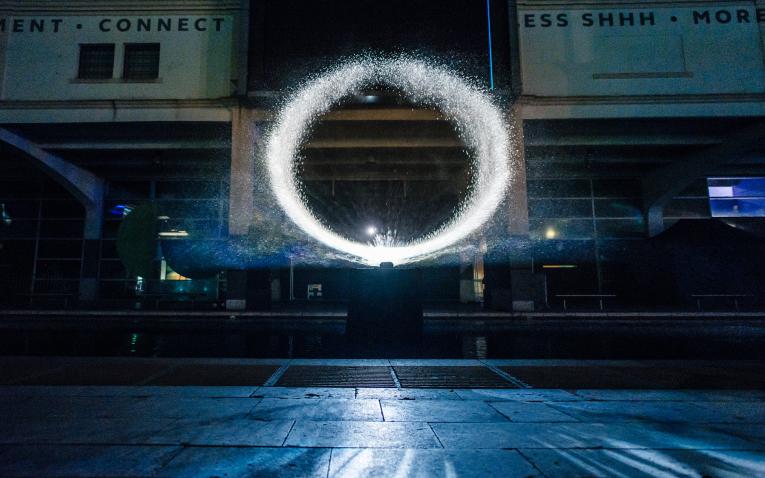
Millennium Constellations (Photo: Jack Offord)
This is a testbed extraordinaire. Whereas you would usually expect a lab with some terminals, data visualisations and a demo without much of an engaging user experience in its own right, Layered Realities did the complete opposite. The team of experts at Smart Internet Lab and their partners took a huge leap of faith inviting us and the general public to provoke, communicate and interpret the research in the wild.
As University of Bristol’s Pro-Vice Chancellor Nishan Canagarajah said:
“(…) the technologies need to understand about the creatives, and the creatives need to understand about the technology, so in a few years you won’t hear about STEM, you will hear about STEAM, which is Science, Technology, Arts and Mathematics. It’s how these disciplines come together, and when they come together new disciplines will emerge, new businesses will emerge, and that’s what is exciting and that’s what we have in Bristol right now. The partnership with Watershed is critical for the University, to bring these communities together.”
As with all introductions to new technology, we should carefully interrogate its potential impact. We hosted a series of 5G Fellowships where thinkers shared their creative responses to what differences 5G might make to culture, society and the economy. Here they considered such topics as the mass, simultaneous usage of mobile phones, issues of privacy and inequality, how 5G can impact physical, mental and emotional connections, and the wide-ranging impact it may have on the music industry. The talks ended with a presentation by Smart Internet Lab’s director Dimitra Simeonidou about the current testbed and future deployments in the region. Tim Kindberg, who was the editorial lead for the talks, wrote a more in depth blog summarising the talks.
We commissioned Bristol City’s poet (from May 2018) Vanessa Kisuule to write a spoken word piece around the near future of technology and what it means for Bristol and the people within, focussing on the themes of change, innovation and how people are at the centre of all of these new developments. “Stop. Patience. Pause” and watch the poem here:
Those who really wanted to get into the nitty gritty of 5G could visit a marquee stuffed with 5G demos and meet the researchers behind them. The titles ‘Massive MIMO’ (basically the tech that will allow for a huge amount of simultaneous devices in a condensed area whilst maintaining good performance levels) and ‘5G in a box’ (basically the tech that will make switches between networks on your phone feel seamless) might not sound inspiring when you are not au fait with technology, but once you get past the language they are very interesting.
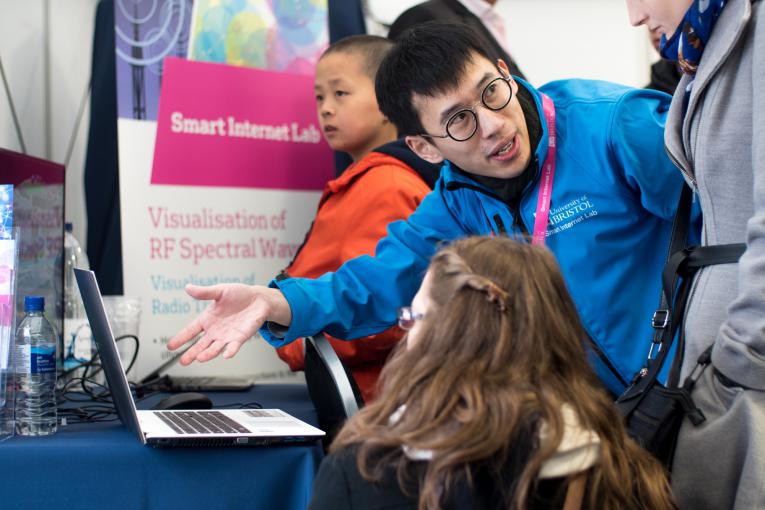
Smart Internet Lab (Photo: Jon Aitken)
Bristol has always been a place where experimentation, cutting edge technology, a pioneering spirit and creativity have been welcomed with open arms. As with all great things in life: people are at the heart of this. The Layered Realities, 5G showcase was a multi-party collaboration, funded by the Department of Digital, Culture, Media and Sport bringing together engineers, academics, artists, thinkers, creators and producers. For Watershed it brought together our UWE and Watershed Creative Producing MA Students as well as projects from our Playable City programme and an event manager who is part of our Creative Producers International cohort which felt very special. The amazing team of experts led by the phenomenal Dimitra Simeonidou at the University of Bristol’s Smart Internet Lab, who are leading on this testbed, are instrumental in how 5G will take shape in the future.
Bristol is increasingly at the core of new emerging technologies, as captured by Watershed’s Chief Executive Dick Penny in this blog for DCMS about Watershed being one of the first spaces to offer always on, free, high capacity wi-fi and the setting up of the Pervasive Media Studio. Let's see where technology will take the city next - and what opportunities there will be for all...
Smart Internet Lab has secured funds to establish ‘5GUK Test Networks’ a national asset, funded by the UK Government’s Department for Digital, Culture, Media and Sport (DCMS) ‘5GUK Test Networks’. The Layered Realities weekend, 5G showcase brings together the University of Bristol’s Smart Internet Lab and Watershed, We The Curious, BT, Nokia, Zeetta, Cambridge Communications Systems, PureLiFi and BiO.
The Layered Realities Weekend, 5G Showcase is produced by Watershed on behalf of the Smart Internet Lab, University of Bristol.
With thanks to:
Dick Penny - Watershed Chief Executive
Clare Reddington - Watershed Creative Director
Luke Emery – Event Manager
Graham Johnson – MA Creative Producing Placement student
Watershed’s Pervasive Media Studio team
Oliver Humpage, Watershed Head of ICT
Watershed Communications, Operations, ICT, Front Of House, Finance
All the ushers and our runner.
The University of Bristol’s Smart Internet Lab team
Zeetta Networks
We The Curious Estates, Facilities and Events teams
SXS Events
Ladbury PR
Bristol Old Vic Set department
The artists & Fellows:
Duncan Speakman, Uninvited Guests, Sam Steer and F E N Y C E
Joanie Lemercier, Julliette Bibasse
Seth Honnor, Katie Keeler, Andy Wood, All Seeing Eye, Toni Hankinson
Vanessa Kisuule
Jen Stein, Watershed's Professor of Design Futures
Tim Kindberg
ginger Coons
Stuart Nolan
Jake Applebee

